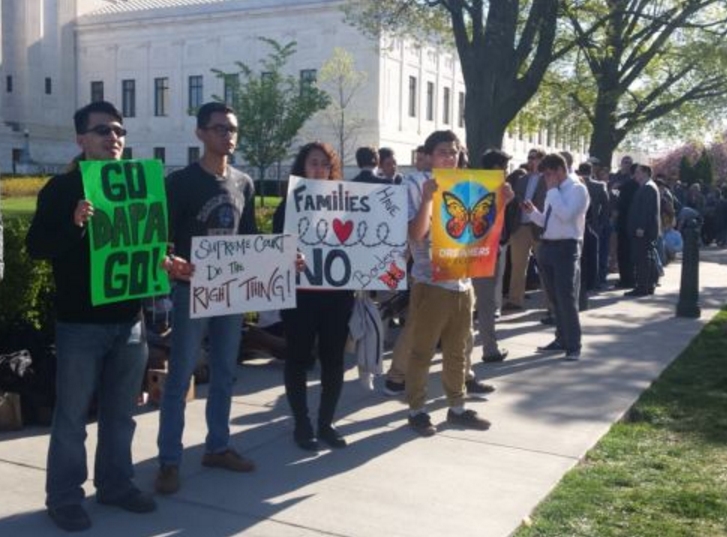“As always, we will go to court to challenge illegal policies, but it is equally essential that the public push back, as it did with family separation,” one rights advocate said.
President-elect Donald Trump is set to begin his promised mass deportation of undocumented immigrants as soon as he takes office on January 20, 2025, even as rights groups are mobilizing to stop him.
Trump national press secretary Karoline Leavitt toldFox News Wednesday morning that “the American people delivered a resounding victory for President Trump.”
“It gives him a mandate to govern as he campaigned, to deliver on the promises that he made, which include, on Day 1, launching the largest mass deportation operation of illegal immigrants that Kamala Harris has allowed into this country,” Leavitt said.
[perfectpullquote align=”right” bordertop=”false” cite=”” link=”” color=”” class=”” size=””]”We have a simple message for President-elect Trump or his deputies if they decide to make good on their despicable plans: We will see you in court.”[/perfectpullquote]
Trump has pledged to conduct the largest deportation in U.S. history, with running mate and now Vice President-elect JD Vance promising 1 million deportations each year. The plan would likely rely on mobilizing federal agencies, the military, diplomats, and Republican-led states while using federal funds to pressure uncooperative states and cities into complying.
The stocks of private prison companies like GEOGroup and Core Civic rose significantly after Trump’s win, and private contractors had already been discussing ahead of the election how to build enough detention space to accommodate Trump’s plans.
A study released by the American Immigration Council in October found that a massive, one-time deportation program of the estimated 13.3 million migrants in the country without legal status would cost the government at least $315 billion while a 1-million-a-year approach would cost $88 billion a year for a total of $967.9 billion. It would also shrink the nation’s gross domestic product by between 4.2 and 6.8%, not to mention the massive human cost to immigrant families, as around 5.1 million children who are U.S. citizens live with an undocumented family member.
The council also warned that such a program would likely threaten the well-being of all immigrants and increase vigilantism and hate crimes.
“As bad as the first Trump administration was for immigrants, we anticipate it will be much worse this time and are particularly concerned about the use of the military to round up immigrants,” Lee Gelernt, a lawyer with the American Civil Liberties Union who fought the first Trump administration on family separation and other policies, toldThe Washington Post. “As always, we will go to court to challenge illegal policies, but it is equally essential that the public push back, as it did with family separation.”
Exit polls show that 56% of U.S. voters favor offering immigrants already in the U.S. a pathway to citizenship, while Data for Progress found that survey respondents did not favor deportation for 7 out of 9 categories of people who might be caught up in a mass deportation scheme.
The ACLU has urged cities and states to take steps to protect their undocumented residents ahead of January 20.
“They should prepare for mass deportations because those will wreak havoc on the communities,” Noreen Shah, director of government affairs at the ACLU’s equality division, toldNewsweek. “It will mean kids who go to school and their parents are gone and not there to pick them up at the end of the day.”
In particular, legal groups are gearing up for Trump to potentially evoke the Alien Enemies Act of 1798, which authorizes the country to deport noncitizens of a hostile nation. It has only been used three times, most recently to detain Japanese Americans during World War II.
“Many fear that a second Trump administration would seek to use this law to justify indefinite detention and remove people from the country swiftly and without judicial review,” Shah told Reuters.
The Brennan Center for Justice has called on Congress to repeal the act.
“This law was shameful and dangerous back when it was created 200 years ago,” the center’s Marcelo Agudo wrote in October. “It’s even more so today. It must be repealed or overturned.”
Several other organizations pledged to continue defending immigrants and refugees after Trump declared victory.
“We have a simple message for President-elect Trump or his deputies if they decide to make good on their despicable plans: We will see you in court,” Karen Tumlin, founder and director of Justice Action Center, said in a statement. “And, we have a message of love to immigrant communities, we see you, we are you, and we will stand with you.”
Calling Trump’s win “one of the most dangerous moments in our country’s history, National Immigration Law Center president Kica Matos said the organization had led a “movement-wide effort to plan for this moment.”
“Trump and his allies told us what he plans to do: mass deportations, ending birthright citizenship, ending the right to public education for immigrant children, internment camps, and using the military to hunt down immigrants. We should take him at his word,” Matos said.
She continued: “One thing is certain: we cannot and will not retreat. For more than 40 years, NILC has been steadfast in our fight to defend the rights of low-income immigrants and their loved ones. We successfully fought Donald Trump before, and we will do it again.”
The American Immigrant Lawyers Association (AILA) pledged to continue working for its clients.
“If implemented, the anti-immigrant policies avowed by candidate Trump will inflict lasting damage to the American economy, communities, and character,” AILA Executive Director Benjamin Johnson said in a statement. “AILA and its more than 16,000 members will continue to defend the Constitution and stand against laws and policies that violate due process, undermine civil rights, or denigrate the contributions of immigrants. Our future prosperity depends on not giving up. We must stand together and work towards a brighter future.”
Refugees International also promised to continue with its “shared commitment to rights and refuge for people forced from their homes.”
“Amid historic levels of global displacement, the incoming Trump administration plans to enact an anti-refugee, anti-asylum agenda that will endanger millions of people—both those threatened by crises overseas and those who have been welcomed as neighbors into communities across the United States,” the group’s president, Jeremy Konyndyk, said in a message to supporters. “Yet we hold on to hope, even as we are clear-eyed about the daunting struggles ahead.”
Knowndyk added: “As we do under any presidential administration, we will work tirelessly with all of you to defend and advance the rights, protection, and well-being of all people forced to flee their homes.”
United We Dream, the largest U.S. organization led by immigrant youth, committed to building the “largest pro-immigrant movement this country has ever seen.”
“Immigrant young people of United We Dream declare ourselves hopeful and clear eyed about the fight ahead,” said the group’s executive director Greisa Martínez Rosas. “With Trump pledging to carry out the largest deportation effort in our country’s history—ctivating the military to raid our communities, schools, hospitals, and more in order to round up our people into concentration camps—young, Black, brown, and queer leaders who have been at the vanguard of our movement and of creating meaningful change are ready move mountains to protect our communities.”
Common Dream’s work is licensed under a Creative Commons Attribution-Share Alike 3.0 License. Feel free to republish and share widely.
[content id=”79272″]








